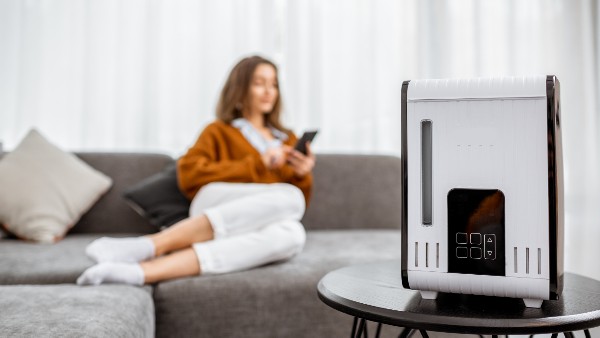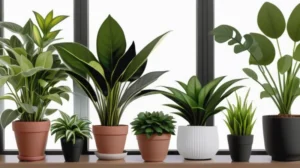Here are the top 5 reasons you may want to consider using an air purifier in your home:
Unlock the Benefits: Top 5 Reasons to Get an Air Purifier
Improve Air Quality
Air purifiers can help to remove pollutants, such as dust, dirt, pet dander, and smoke, from the air in your home, resulting in a cleaner and healthier environment.
Air purifiers work by drawing in air from the surrounding environment and passing it through a series of filters that remove contaminants from the air. The specific type of filter used in an air purifier will depend on the type of pollutant being targeted.
For example, some air purifiers use mechanical filters, such as HEPA (High-Efficiency Particulate Air) filters, to remove particles such as dust, dirt, and pet dander(skin particles) from the air. These filters work by trapping these particles within their fibers as the air passes through the filter.
Other air purifiers use chemical filters, such as activated carbon filters, to remove gasses and odors from the air. These filters work by adsorbing the gasses and odors onto their surface, where they are held until the filter is replaced or regenerated.
Some air purifiers also use ultraviolet (UV) light to kill bacteria and viruses that may be present in the air. These air purifiers typically use a combination of filters and UV light to provide comprehensive air purification.
Alleviate Allergy Symptoms
If you or someone in your household suffers from allergies, an air purifier can help to reduce allergy-inducing particles in the air, leading to fewer symptoms and a more comfortable home.
Allergies are caused by an immune system reaction to substances that are inhaled, ingested, or come into contact with the skin. These substances, known as allergens, can include pollen, pet dander, mold spores, and dust mites. When an allergic individual is exposed to these allergens, their immune system reacts by releasing histamines, which can cause symptoms such as sneezing, itching, and congestion.
Air purifiers can help to alleviate allergy symptoms by removing allergens from the air. Many air purifiers use filters, such as HEPA filters, which are specifically designed to capture and remove small particles, including allergens, from the air. By reducing the number of allergens in the air, an air purifier can help to reduce allergy symptoms and create a more comfortable living environment for those with allergies.
It’s important to note that not all air purifiers are created equal when it comes to removing allergens. Some air purifiers are more effective at removing specific types of allergens than others. For example, HEPA filters are generally very effective at removing pollen, pet dander, and dust mites from the air, while activated carbon filters are more effective at removing gases and odors.
If you or someone in your household suffers from allergies, it’s important to choose an air purifier that is specifically designed to remove the types of allergens that are causing the symptoms. It may also be helpful to consult with an allergist or other medical professional to determine the most appropriate type of air purifier for your needs.
Reduce The Risk of Respiratory Issues
Poor indoor air quality can contribute to respiratory problems, such as asthma and COPD. Using an air purifier can help to improve the air quality in your home and reduce the risk of these issues.
There are several ways in which air purifiers can help to reduce the risk of respiratory issues, such as asthma and COPD.
First, air purifiers can help to remove a wide range of contaminants from the air, including particulates, gases, and odors. These contaminants can irritate the respiratory system and contribute to respiratory problems, especially in individuals who are sensitive or have pre-existing respiratory conditions. By removing these contaminants from the air, an air purifier can help to reduce the risk of respiratory issues.
Second, air purifiers can help to reduce the levels of allergens in the air, which can also contribute to respiratory problems. As mentioned earlier, allergens, such as pollen, pet dander, and dust mites, can trigger an immune system response that causes symptoms such as sneezing, itching, and congestion. By removing these allergens from the air, an air purifier can help to reduce the risk of respiratory issues in individuals who are sensitive to these substances.
It’s important to note that while air purifiers can be beneficial in reducing the risk of respiratory issues, they are not a replacement for proper medical treatment. If you or someone in your household suffers from respiratory problems, it’s important to consult with a medical professional to determine the most appropriate treatment plan.
Remove Odors
Air purifiers can help to eliminate unpleasant odors, such as smoke and pet odors, from your home.
Air purifiers can be particularly effective at removing odors from the air, making them a useful tool for improving the air quality in your home or workspace. Here are a few specific benefits of using an air purifier to remove odors:
- Improved indoor air quality: Odors can be caused by a variety of sources, such as cooking, smoking, pets, and household cleaning products. These odors can be unpleasant and contribute to poor indoor air quality. An air purifier can help to remove these odors from the air, resulting in a fresher and more pleasant living environment.
- Health benefits: Some odors can be harmful to your health, especially if they are caused by volatile organic compounds (VOCs) or other toxic gases. An air purifier with a chemical filter, such as an activated carbon filter, can help to remove these odors from the air, reducing the risk of negative health effects.
- Increased comfort: Odors can be especially bothersome for individuals who are sensitive to smells or who have allergies. By removing odors from the air, an air purifier can help to increase overall comfort in the living environment.
- Reduced impact on guests: If you frequently have guests in your home, strong odors can be off-putting. An air purifier can help to remove odors, ensuring that your guests have a more pleasant experience while they are visiting.
Overall, using an air purifier to remove odors can have a number of benefits, including improved indoor air quality, health benefits, increased comfort, and reduced impact on guests.
Improve Sleep
Many people find that using an air purifier can help to improve their sleep quality, as it removes allergens and other pollutants from the air that may cause breathing difficulties or allergies.
There are several ways in which using an air purifier can help to improve sleep:
- Removing allergens: Allergens, such as pollen, pet dander, and dust mites, can cause allergy symptoms that can interfere with sleep. An air purifier with a HEPA filter can help to remove these allergens from the air, reducing allergy symptoms and improving sleep.
- Reducing noise: Some air purifiers, especially those with mechanical filters, can generate noise that may be disruptive to sleep. However, there are also many air purifiers on the market that are designed to operate quietly, making them a good choice for use in the bedroom.
- Improving air quality: Poor air quality can also be a factor in sleep disturbances. An air purifier can help to remove a wide range of contaminants from the air, including particulates, gases, and odors, resulting in improved air quality and better sleep.
- Reducing the risk of respiratory issues: Respiratory issues, such as asthma and COPD, can also interfere with sleep. An air purifier can help to reduce the risk of these issues by removing allergens and other contaminants from the air, resulting in better sleep.
Overall, using an air purifier to improve the air quality in your bedroom can have a number of benefits for sleep, including reduced allergy symptoms, reduced noise, improved air quality, and reduced risk of respiratory issues. It’s important to choose an air purifier that is specifically designed for use in the bedroom and that operates quietly to maximize these benefits.
Summing Up: The Many Ways an Air Purifier Can Benefit Your Home and Health
Using an air purifier in your home can provide numerous benefits, including improved air quality, allergy relief, reduced risk of respiratory issues, odor removal, and improved sleep. These benefits can lead to a healthier and more comfortable living environment for you and your family.
When choosing an air purifier, it’s important to consider the specific needs and preferences of your household. There are many different types of air purifiers available, each designed to target specific contaminants and provide specific benefits. By considering your needs and doing your research, you can choose the best air purifier for your home.
And don’t forget to regularly maintain and replace your air purifier’s filters to ensure optimal performance. By following these tips, you can enjoy the many benefits of an air purifier in your home.








